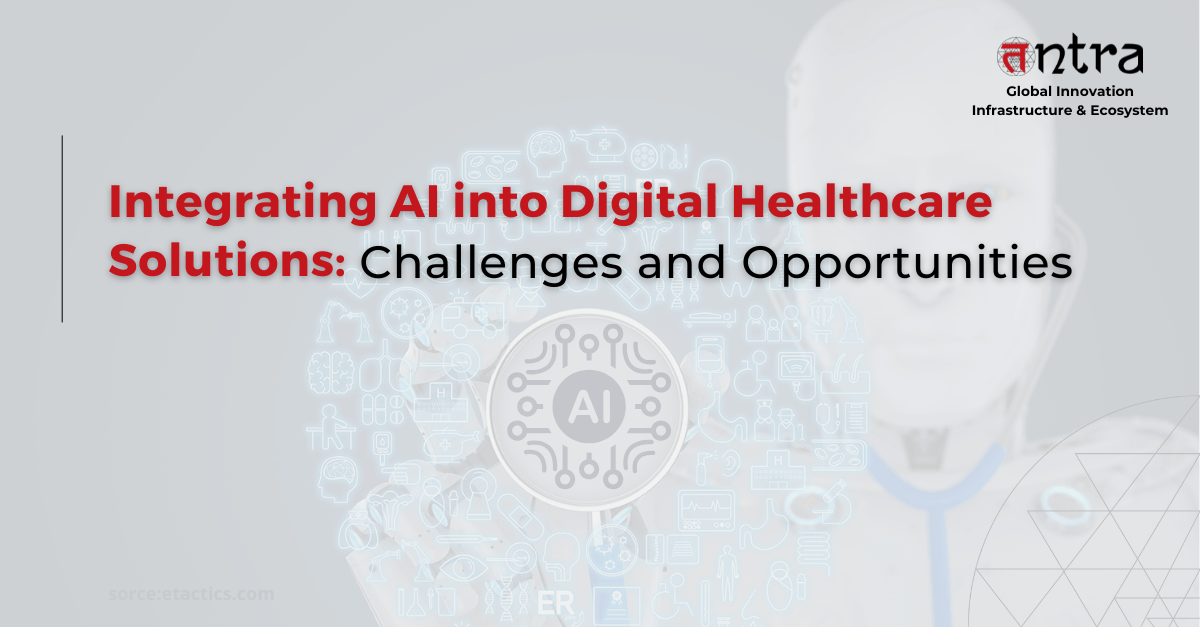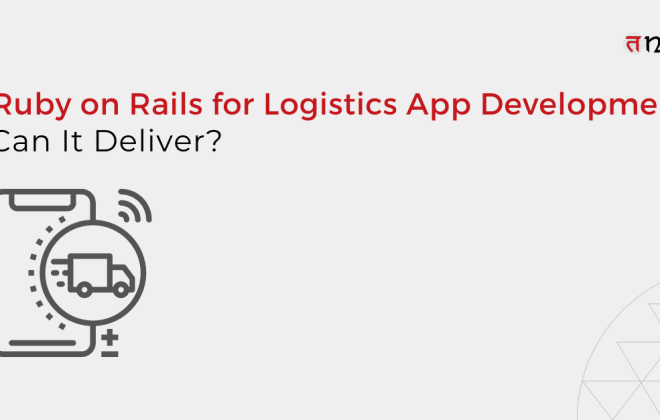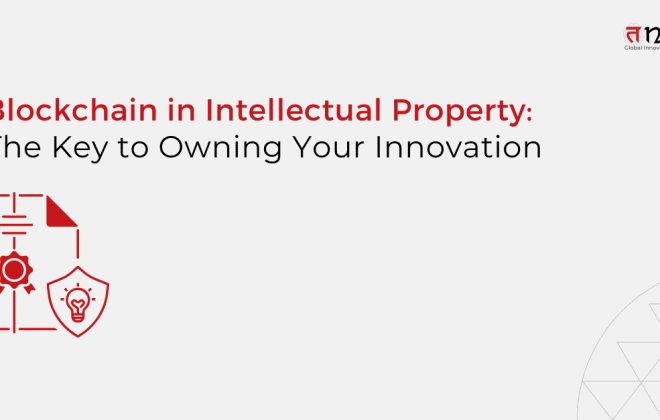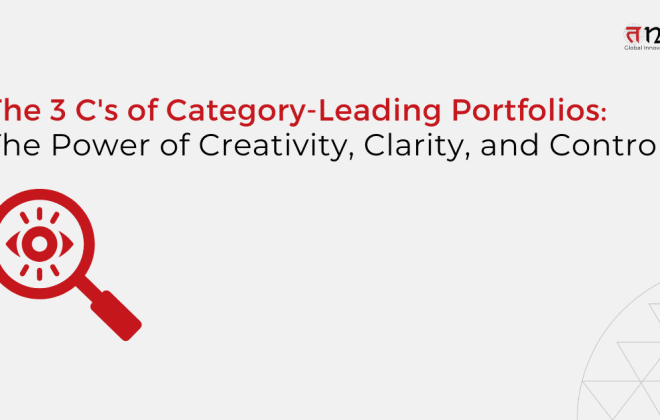
Integrating AI into Digital Healthcare Solutions: Challenges and Opportunities
Table of Contents
ToggleDevelopments in the digital health space through AI in personalised care, rapid diagnostics and cost-effective models are shaping the future of medicine. Nonetheless, the use of AI in healthcare systems comes with challenges such as data security issues and a reluctance from healthcare professionals. The potential of AI to enhance patient outcomes and healthcare efficiency is clear, despite these challenges. Continue reading to learn how AI is making waves in healthcare.
Artificial Intelligence (AI) has become a game-changer in healthcare in recent years. From disease diagnosis to improved patient outcomes and admin efficiency, AI-led healthcare solutions are elevating digital health to the next stage. But like any disruptive technology, the integration of AI in digital healthcare has its own unique challenges and opportunities.
Let’s take a look at how AI is imprinting itself within digital healthcare, the challenges facing healthcare providers, and the wondrous potential ahead. So, whether you’re in the healthcare space, or just interested in this convergence of technology and health, this one’s for you.
The Role of AI in Digital Health: A Journey to Transformation
Artificial Intelligence does not mean that machines will replace human judgment in digital healthcare but rather AI improves how healthcare is delivered. AI in digital healthcare can process hundreds of thousands of known ailments with all available data even beyond human capabilities. This results in quicker diagnoses, tailored treatments, and ultimately improved patient outcomes.
Even imagine if your doctor didn’t have to act on gut feeling but instead could use predictive analytics to see what your health would require. And that’s what digital health platforms could do with AI. Similar to the way AI can comb through myriads of medical records and pictures through machine learning algorithms to pinpoint early signs of illnesses, such as cancer, that might evade the traditional route.
AI plays an important role in healthcare technology — it can predict patient outcomes, recommend the best course of action and even assist doctors in making treatment decisions. Instead of replacing some healthcare professionals, these tools supplement the profession and enhance the capabilities of healthcare professionals. For example, applying AI can streamline administrative processes such as patient scheduling, billing, and claims processing that otherwise consumes a lot of time for healthcare professionals and helps them focus on what is important—treating and caring for patients.
Challenges of AI Integration in Digital Healthcare
Now, we all love where the AI can take us (at least as much as we can enjoy a fifty-year wait list), but integration isn’t all sunshine and rainbows. We face genuine challenges of AI integration in healthcare. Let’s break them down.
Data security and privacy is one of the biggest hurdles. We all know that medical data is highly sensitive but when AI enters the picture, the concern is multiplied. AI in digital health platforms are primarily driven by patient information for clinical decision making. Any breach or mishandling of this data can then, therefore, not only compromise patient trust, but can also result in legal ramifications. With laws such as HIPAA (Health Insurance Portability and Accountability Act) having been established, compliance with these regulations is of utmost importance for any AI-based healthcare solution.
The second challenge comes with integration into existing systems. Most healthcare systems are already carrying legacy software that doesn’t integrate with any modern AI technologies. However, deploying AI software product engineering solutions into these systems is often pricey, complex and may be painful. For maximum benefit from AI, healthcare organizations need their infrastructure updated, but that takes investment and know-how, which not every institution readily possesses.
And don’t forget the human element. Healthcare providers, despite their qualifications, may have reservations about AI-led healthcare. They might worry that AI may replace their judgment or make their jobs redundant. Overcoming this resistance will involve convincing doctors and nurses that AI has the potential to be a helpful assistant, not a foe. Education and training must follow so that health care workers (HCWs) feel competent using AI tools in their daily practice.
Opportunities of AI in Healthcare Technology
The challenges are many, but the opportunities of AI in digital healthcare frontier are clear. If you’re in healthcare or healthcare tech, you may want to listen up to these opportunities.
- Personalized Medicine and Tailored Treatments: Personalized healthcare is one of the most exciting opportunities AI offers in digital health. Genomics could lead to personalized medicine, where treatments are tailored to you — how you metabolize, how you take medicine, etc. Using machine learning on individual patient data, AI can develop personalized treatment plans that outperform traditional methods. For example, AI could analyze your health records, glean your medical history, and recommend preventative measures or treatments tailored specifically to you.
- Early Disease Detection and Predictive Analytics: Early disease detection is also one of the benefits of integrating AI into healthcare systems. AI-powered healthcare solutions can access and analyze large volumes of medical data to find conditions before they escalate into serious health threats. With respect to cancer, for example, AI can detect minuscule inconsistencies in medical images that human vision may miss. This allows earlier detection, which helps with better patient outcomes and the potential for saving lives.
- Cost-Effective Healthcare Models and Improved Access: AI-enhanced approaches to healthcare application development can also minimize medical expenses. By automating repetitive tasks such as data entry, scheduling, and even initial patient consultations, AI in healthcare technology has the potential to help reduce time and increase financial efficiency. This gives rise to a healthcare experience that is more organized and easier to access, particularly for people in rural or underserved areas where healthcare infrastructure is compromised.
How AI is Transforming Digital Healthcare Solutions
Having discussed the advantages that AI has to offer, let’s take a look at how exactly AI is transforming digital healthcare solutions.
- Accurate Diagnostics and Faster Decision-Making: AI software product engineering services can help healthcare providers diagnose conditions more quickly and accurately. From machine learning algorithms that can analyze medical imaging data — like X-rays or MRIs — to capabilities that can recognize patterns that might be overlooked by a human physician. This means that conditions such as tumors or even fractures are detected sooner, so they can be treated sooner with better outcomes.
- Predictive Analytics for Proactive Healthcare: AI possesses one of the strongest capabilities of predicting patient outcomes. Machine learning helps analyze patient data and predict the chances of developing certain diseases. enabling proactive measures by healthcare providers to address conditions before they worsen or even occur in the first place. AI can act as a digital fortune teller for doctors, offering them insights into health problems before they get critical.
- Virtual Assistants and Enhanced Patient Care: The rise of telemedicine has created room for AI in virtual healthcare. Healthcare providers are utilizing AI-powered chatbots and virtual assistants to provide more continuous care for patients. These AI assistants can offer health information to patients, answer questions, schedule appointments, or even remind them about medication without human intervention. For health-care providers, this translates to less time spent fielding phone calls and attending to administrative tasks, allowing more time for meaningful interactions with patients.
Overcoming Challenges in AI-Powered Digital Health
The secret is in collaboration. The healthcare industry compliance to standards and regulations should be collaborated with technology consulting solutions and healthcare software development professionals to produce AI-enabled systems.
Endocrinology and diabetes specialists need supportive training. AI tools are partners, not adversaries. Trained properly, the healthcare workforce can be an AI-enabled superpower, allowing for enhanced decision-making aided by technology and ultimately better patient outcomes.
And a mindset shift is required. AI is meant to assist — never replace — healthcare professionals. It is about striking that balance between human intelligence and what can be done by AI to be able to build a healthcare ecosystem that has the elements of efficiency and compassion.
Final Thoughts on AI in Digital Healthcare
One of the most promising areas to leverage are the opportunities for AI in personalized healthcare. As healthcare shifts toward an individualized approach to care, AI brings phenomenal possibilities for customizing treatment for the individual needs of every patient. AI can also analyze an individual’s health data — from genetic data to lifestyle factors — and recommend the most effective treatments or preventive measures.
This can result in better health outcomes since treatments are tailored to fit the patient’s unique biology, rather than using a one-size-fits-all method. AI-Powered healthcare application development: It’s not a trend, it’s the future of medicine. If you are looking to integrate AI in your healthcare system, Tntra, a leading software product engineering company, is here to help.
Schedule a call with one of our 100+ AI in healthcare experts today.
FAQs
What are the opportunities for AI in healthcare?
AI provides better treatment options. AI in healthcare increases revenue by improving operational performance, end-of-life care, productivity and revenue optimization, personalized treatments and early disease detection.
What are AI-powered healthcare solutions?
AI in healthcare involves using machine learning algorithms and data analysis to enhance diagnostics, predict outcomes and improve patient care.
What is an example of AI in the healthcare sector?
In healthcare, AI is used in medical imaging for early detection of conditions such as cancer, and helps offer more precise diagnoses and treatment plans.
What is the challenge of AI in healthcare?
Ensuring data security, overcoming resistance from healthcare professionals, and integrating AI into existing healthcare systems are challenges.
How to integrate AI into healthcare systems?
Integration involves working alongside an IT consulting partner, maintaining patient data privacy, as well as training medical personnel.





